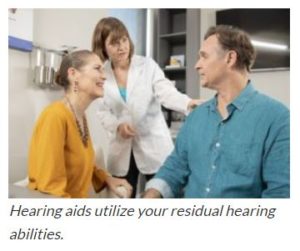If you have hearing loss, your remaining natural hearing, or residual hearing, refers to how well you can hear without the use of hearing aids. While you may feel like it doesn’t matter now that you have hearing loss, it’s actually in your best interest to try your hardest to protect your residual hearing throughout your lifetime – according to an article by Joy Victory in Healthy Hearing.
Why is your residual hearing important?
 Why? Chiefly because hearing aids do not cure hearing loss—they merely amplify sounds loud enough so that you can hear them using your residual hearing. They’re programmed to your unique pattern of hearing loss, whether you have high-frequency or low-frequency hearing loss, for example.
Why? Chiefly because hearing aids do not cure hearing loss—they merely amplify sounds loud enough so that you can hear them using your residual hearing. They’re programmed to your unique pattern of hearing loss, whether you have high-frequency or low-frequency hearing loss, for example.
The more hearing you have to work with, the better job your hearing aids can do, explains Dr. Robert M. Ghent, Jr., a research audiologist and manager of the Howard Leight Acoustical Testing Laboratory for Honeywell Safety Products.
“This is why it is vitally important to protect residual hearing,” he explains in a blog post on protecting hearing loss among hearing-impaired workers.
How to protect your residual hearing
Use hearing aids
It may have taken years for you to finally get hearing aids, but after purchasing them, it’s important to actually wear them. Hearing aids stimulate your auditory nerve and help keep your brain from “reassigning” brain cells to other activities besides hearing.
It is common to have to go back to the hearing healthcare professional to get the hearing aid settings adjusted after getting your first pair, and it may even take a few tries.
Work with your hearing care professional to make sure that your devices work well for you, and don’t be afraid to inform your hearing healthcare professional if you’re having difficulty using your hearing aids in certain listening environments.
Once the settings are optimal, use your hearing devices as much as possible, working up to wearing them during all of your waking hours. If you decide not to use your hearing aids, you are not only wasting money on a beneficial investment, your hearing loss will likely begin to worsen.
Wear two hearing aids
While you may have different degrees of hearing loss in both ears, your audiologist will recommend that you get two hearing aids instead of one. The main reasons for this:
Two hearing aids make sure that you are able to hear everything around you–including noises from the front, back and both sides–so that your perception of hearing is more natural.
Two hearing aids ensure you are able to maintain your residual hearing ability in the unaided ear. If you only wear one device, your unaided ear is left out of a lot of the conversation. This under-stimulation of the auditory nerve for that ear will actually deteriorate the hearing you still have in that ear at a quicker rate.
Reduce noise exposure as much as possible
When using hearing aids, it’s important to make sure that you are caring for the hearing that you still have, and that means that you should limit your exposure to loud noises to prevent noise-induced hearing loss. Loud noises can damage the inner ear hair cells, so that your hearing loss will continue to worsen.
When you’re at home, make sure to keep radios and televisions set to a low volume level. With your hearing aids, you should be able to hear well enough without blasting the sound.
Your hearing can also be damaged by using loud equipment such as a lawn mower, leaf blower or power saw. If you are using loud devices, always wear protective foam plugs or ear muffs. If you are out and about at a place with loud music, like a concert or production, always protect your ears.
If you take prescription medications for an illness, make sure that you speak with your doctor about your hearing loss. Some drugs will have an effect on hearing or cause tinnitus.
Read the full article on how to protect residual hearing by CLICKING HERE.
We are here to help if you or a family member is having any difficulties with hearing, hearing aids, hearing aid apps or Tinnitus please give us a call at 727-323-2471 and set up an appointment.
We can help you.
Susan E. Terry, Au.D., F-AAA, F-NAP
Doctor of Audiology
Board Certified
P.S. We are here to help if you have any questions about your hearing, feel free to give us a call at 727-323-2471